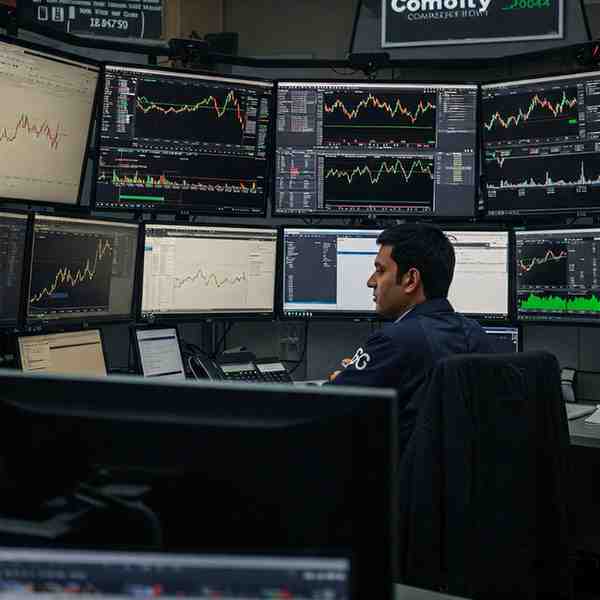
Different Types of Commodities and Their Trading Characteristics
Different Types of Commodities and Their Trading Characteristics
Commodities serve as the backbone of global and national economies, providing essential raw materials for industries across sectors. In India, the commodity market plays a pivotal role in price discovery and risk management, making commodity trading an attractive option for portfolio diversification. However, successful trading requires a deep understanding of the different types of commodities and their unique market dynamics. Leveraging an online commodity trading platform effectively necessitates knowledge of these factors. This article provides an insightful overview of key commodity categories, their trading characteristics, and essential considerations for traders in India.
Energy Commodities: Volatility and Global Influence
Energy commodities, including crude oil, natural gas, and coal, are known for their high volatility and sensitivity to global economic and geopolitical developments. Crude oil prices, for instance, are significantly impacted by factors such as OPEC production decisions, geopolitical tensions, and global demand fluctuations. Natural gas prices vary with seasonal demand, particularly during peak heating and cooling periods, while coal remains a crucial energy source despite growing environmental concerns. Given their rapid price swings, trading energy commodities requires a strategic approach and a keen awareness of market-moving events.
Agricultural Commodities: Seasonality and Supply Chain Factors
Agricultural commodities such as wheat, corn, soybeans, cotton, and sugar are heavily influenced by weather patterns, planting cycles, and global supply chains. In India, the monsoon season plays a crucial role in determining crop yields, making it a key factor for traders to monitor. Additionally, factors like government policies, export demand, and shifting consumption trends affect pricing. For instance, soybean prices are often driven by global trade agreements and harvest forecasts, while livestock markets are impacted by feed costs and demand shifts. Understanding these dynamics is essential for navigating the agricultural commodity market.
Metal Commodities: Industrial Demand and Economic Indicators
Metals are broadly classified into two categories: precious metals (gold, silver, platinum) and industrial metals (copper, aluminum, steel). Precious metals, especially gold, are widely used as a hedge against inflation and economic uncertainty. Their prices tend to rise during financial instability, making them a preferred investment during market downturns. On the other hand, industrial metals are closely tied to economic growth, infrastructure development, and manufacturing activity. For example, copper prices often serve as an indicator of industrial expansion, given its widespread use in construction and electrical applications. Traders should analyze macroeconomic trends and industrial demand to make informed decisions when dealing with metal commodities.
Mobile Trading Platforms: Enhancing Accessibility and Efficiency
With the rise of digital transformation, mobile trading platforms have revolutionized commodity trading, providing traders with real-time access to market data, trading tools, and seamless execution of trades. These platforms offer features such as live price tracking, technical analysis indicators, and instant order placements, allowing traders to respond quickly to market movements. In India, mobile trading apps have gained popularity due to their user-friendly interfaces and integration with regulatory frameworks. Choosing a reliable mobile trading platform with robust security measures, efficient order execution, and comprehensive market insights can significantly enhance a trader’s efficiency and decision-making capabilities in the commodity market.
Key Considerations for Trading Commodities in India
The Indian commodity market is regulated by the Securities and Exchange Board of India (SEBI), ensuring transparency and investor protection. When selecting a commodity broker, traders should consider factors such as regulatory compliance, trading platform features, and customer support services. Understanding key aspects like margin requirements, contract specifications, and delivery mechanisms is crucial for efficient trading. Online commodity trading platforms provide access to real-time data, technical analysis tools, and market insights, helping traders make informed decisions.
Conclusion
Commodities encompass diverse asset classes, each with distinct trading characteristics. Energy commodities are highly volatile and react to global events, while agricultural commodities are influenced by seasonal and supply chain factors. Metal commodities, driven by industrial demand and macroeconomic trends, offer opportunities for hedging and investment. To succeed in commodity trading, particularly in the Indian market, traders should conduct thorough research, choose a reputable trading platform, and stay updated on regulatory guidelines. By mastering these fundamentals, investors can navigate the complexities of commodity markets and enhance their portfolios effectively.
At Goodwill Wealth Management, we understand that experienced as well as new investors demand more than just the basics. That’s why we created Giga Pro, a mobile trading app designed to fuel your investment journey. As a leading stock broker in India, we empower you with the tools and resources you need to succeed. Download the app today to start your trading journey on your Android device: (Download GigaPro Mobile App) or on your Apple device: (Download GigaPro Mobile App)
Related Blogs:
What is Commodity Trading?
What is Sector Rotation and How Does it Work?
Understanding Commodity Markets for Investment Opportunities
How to Implement Diversification for a Profitable Portfolio
Build a Stronger Investment Portfolio Through Diversification
Diversification Strategies: Combining Commodities and Equities
Diversification Strategies: Why Spreading Your Risk Matters
How to Use Sector Rotation to Diversify Your Portfolio
Different Types of Commodities and Their Trading Characteristics
Disclaimer: This blog post is intended for informational purposes only and should not be considered financial advice. The financial data presented is subject to change over time, and the securities mentioned are examples only and do not constitute investment recommendations. Always conduct thorough research and consult with a qualified financial advisor before making any investment decisions.
